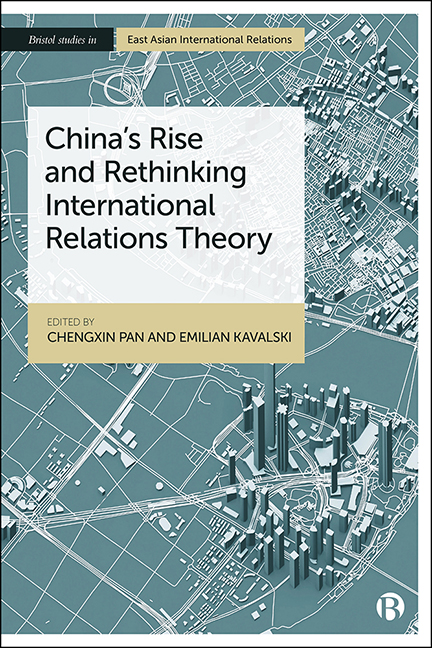Book contents
- Frontmatter
- Contents
- List of Abbreviations
- Notes on Contributors
- Acknowledgements
- Introduction: The Rise of China and Its Challenges to International Relations Theory
- PART I Theorizing China’s Rise: Beyond Eurocentric Knowledge Production
- PART II Theorizing China’s Rise: Critical Reflection on Mainstream Frameworks
- Epilogue: Towards International Relations beyond Binaries
- Index
4 - Friendly Rise? China, the West and the Ontology of Relations
Published online by Cambridge University Press: 15 September 2022
- Frontmatter
- Contents
- List of Abbreviations
- Notes on Contributors
- Acknowledgements
- Introduction: The Rise of China and Its Challenges to International Relations Theory
- PART I Theorizing China’s Rise: Beyond Eurocentric Knowledge Production
- PART II Theorizing China’s Rise: Critical Reflection on Mainstream Frameworks
- Epilogue: Towards International Relations beyond Binaries
- Index
Summary
Introduction
Chinese policy makers, scholars and pundits have attempted to ameliorate fears about China's rise by portraying China as a new and friendlier kind of great power. It is claimed that this represents a new way of relating which transcends problematic Western understandings of self– other relations, and their tendency to slip into domination and enmity. Claims along such lines can be seen in President Xi Jinping's official discourse, which portrays the Chinese nation as culturally predisposed to friendly, peaceful and harmonious behaviour abroad, and which lists friendship as one of 12 key terms for his socialist ‘core value system’ at home (People's Daily Online, 2014; Xi, 2014). These claims have been illustrated in various international nation-branding events, often through the Confucian adage that ‘it is glorious to receive friends from afar’ (Callahan, 2010: 2). They have also been an important part of emerging debates over a possible Chinese School of International Relations (IR) (Noesselt, 2015). Famously, Zhao Tingyang claims that Chinese traditions offer a ‘Chinese ontology, the ontology of relations, instead of the western ontology of things’, which enables the peaceful transformation of enemies into friends (Zhao, 2006: 33, 34; for a discussion, see Nordin, 2016a, 2016b), and researchers discuss ‘China's self-perceived role of a friend versus the (often Western) exploiter’ (Shih and Yin, 2013: 81).
Taking such use of the term ‘friendship’ as a point of departure, this chapter suggests that a reintroduction of friendship to IR can and should be a key contribution brought about by the increasing influence of Chinese politics and scholarship in international relations. Rather than merely denoting a personal and private relationship, friendship denotes a way of thinking about the co-constitution of self with other, and theorizes the dynamics of such co-foundation. This chapter brings together and juxtaposes a number of ways of thinking through the language of ‘friendship’ and analyses the implications of different theorizations for thinking about China's rise and world relations.
The first section of the chapter explains how the recent theorizations of friendship in IR that draw on Chinese thought indeed constitute a re introduction. It draws a sketch of how friendship was a central political category for virtue cultivation and co-constitution in both Chinese and European ancient traditions but was transformed under the modern state system into overarching and general forms of community such as citizenship and nationality.
- Type
- Chapter
- Information
- China’s Rise and Rethinking International Relations Theory , pp. 83 - 101Publisher: Bristol University PressPrint publication year: 2022



